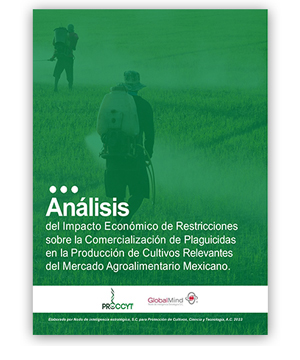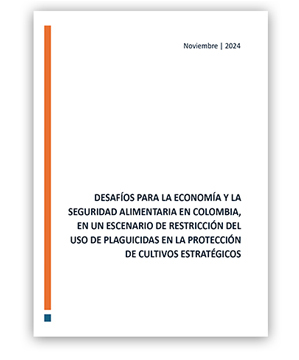Even though without the countryside there is no city, the lack of knowledge about how food is produced creates narratives that fail to reflect the progress made in agricultural sustainability indicators across the region. This was the conclusion of Lloyd Day, Deputy Director General of IICA, and Fernando Mattos, former Minister of Agriculture of Uruguay. Both panelists agreed on the importance of uniting efforts across the agricultural value chain to bring messages on science, technology, and agricultural innovation in Latin America to global conferences. The upcoming United Nations conference will be COP30 on climate change, to be held in Brazil this November. It is precisely in this forum where we must insist that agriculture is part of the climate change solution—not the problem—by presenting sustainability indicators, emphasized Lloyd Day from IICA.

Sustainable Agriculture in Action (SPMF): A Modern Integrated Management Model
Another topic on the Convention’s agenda was a panel on sustainability indicators, featuring the executive directors of national crop protection associations from Chile (AFIPA), Colombia (Procultivos, ANDI), and Guatemala (Agrequima). A clear consensus emerged: the Sustainable Agriculture in Action initiative (SPMF in other regions) is not just a project, but a practical model of governance and management that is already strengthening the credibility, technical capacity, and strategic positioning of the industry in these countries. Panelists noted that integrating SPMF into their associations' planning and daily operations has improved dialogue with authorities, supported farmers, and fostered innovation—while also protecting the license to operate. Each country highlighted different pillars: Chile emphasized regulatory dialogue and pilot plots with family farming; Colombia focused on institutional integration of the model through its technical, communication, and sustainability departments; and Guatemala prioritized training with multiple actors and public-private coordination. The panel ended with a strong call to implement the SPMF model regionally as a shared vision that builds on years of effort, positioning the crop protection industry as a committed, forward-looking actor in the transition to sustainable food systems in Latin America.
Delisa Jiang, Manager of SPMF projects at CropLife International, highlighted the industry's commitment to these initiatives, which are based on science, promote innovation, and encourage the responsible use of crop protection products.

Impact of Potential Crop Protection Products Trade Restrictions
Productivity losses, rural job loss, and food sovereignty threats are some of the consequences of potential restrictions on pesticide trade.
Impact analyses in strategic crops in Mexico and Colombia have revealed the importance of crop protection tools for productivity, employment, and food access. The studies, conducted by Proccyt (Mexico) and Procultivos ANDI (Colombia), have facilitated proactive dialogue with authorities, legislators, and associations, enabling a deeper understanding of the sector's current state and future potential.
María Helena Latorre, Director of Procultivos-ANDI, and Luis Osorio, Director of Proccyt, emphasized this.
The study in Mexico showed that maize, for example, could lose over 37% of productivity due to pests and pathogens that would go unmanaged without crop protection products. In Colombia, losses in key crops could exceed 51%.
Click on each image to view the reports from Mexico and Colombia (available in Spanish only)
EPR Laws for Agriculture
One of the panels at the annual CropLife Latin America meeting focused on the importance of Extended Producer Responsibility (EPR) laws in the region. Directors of associations leading the CampoLimpio container recovery program in Brazil, Mexico, Guatemala, and Chile stressed the need to be proactive in the design and implementation of these laws. It is crucial not to disregard existing regulations on waste—particularly regarding empty pesticide containers. Furthermore, the processes, roles, goals, and responsibilities defined by these laws must be clear and must address the complexity of agricultural waste, as REP laws around the world often focus more on urban than rural waste.
Minor Crop Protection
Anna Gore, Director of the Minor Use Foundation, presented the progress made in prioritizing minor crops in Latin America. The foundation works to provide pest control tools for these crops that comply with safety standards. So far, prioritized crops include bell pepper, tomato, avocado, passion fruit, banana, and eggplant. Key pests include thrips, whiteflies (insects), and anthracnose (a fungal disease).
Illegal Trade
Growing interest from authorities in some countries around illegal trade of crop protection products is one of the key outcomes of the awareness campaign led by CropLife Latin America and its network of national associations. Reports include studies, complaints, and enforcement actions, which have also sparked growing interest from international and regional organizations such as FAO, OECD, TRACIT, and IDB. Continued training with a focus on distributors and building public-private partnerships were recommended actions, according to Javier Fernández, Director of Regulatory Affairs.
Poison Control Centers
“We cannot live without chemicals, just as we cannot live without addressing the consequences of their improper handling. One way to do so is by sustainably promoting Poison Control Centers,” said Dr. Ubier Gómez, a medical toxicologist, who highlighted the importance of keeping these centers operational 24/7 with qualified personnel and sufficient resources.

The 2025 Annual Convention gathered more than 50 participants, including directors, presidents, and staff from the association network. As always, the event enriched and broadened key perspectives for the sector.

















